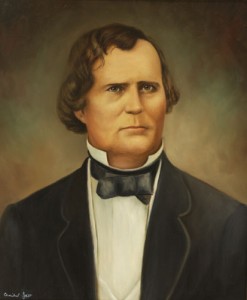From The New-York Times December 25, 1860:
THE SECESSION MOVEMENT.; THE SOUTH CAROLINA CONVENTION. EVENING SESSION.
CHARLESTON, Monday, Dec. 24.
After prayer, a resolution was adopted inviting Gov. PERRY, of Florida, now in the city, to a seat on the floor of the Convention.
Mr. MAGRATH introduced an ordinance that the Judges of the Courts take cognizance in cases in admiralty and maritime jurisdiction for all offences, as under the laws of the United States, hereafter. Referred to a Committee on a Constitution, with Judge MAGRATH added.
Mr. RHETT moved to take up the address to the people of the Southern States, as prepared by the Committee. It was taken up and several amendments proposed.
The declaration of causes which justify the secession of South Carolina from the Federal Union was made a special order. The whole address received innumerable alterations. After a lengthy and not generally interesting debate, the Convention took a recess till 7 o’clock.
Mr. DUNKIN moved to take up the special order, it being the ordinance to provide for a continuance of commercial affairs. He moved for a Secret Session, which was carried.
Information was given this morning in the Convention that several light-house keepers were about vacating their positions.
It is understood that the Secret Session is to confer with the Collector of the port.
The Convention adopted the declaration of immediate causes which induced and justified the secession of South Carolina from the Union.
Waiving the repetition of the causes in the past, she declares to the remaining States and Nations of the world the immediate causes which led to the act. The Declaration refers to the causes which led to the separation from England, and the declaration of the Colonies that they are free and independent States. In pursuance of this declaration thirteen States proceeded to exercise separate sovereignty. Subsequently they entered into a league by the Articles of Confederation, but retaining their sovereignty. Under this declaration the war of the Revolution was fought, at the close of which England acknowledged them free, sovereign and independent States. Subsequently the Union was formed, limited to the words of the grant. The Declaration declares that many of the States have violated the conpact in letter and spirit, and consequently absolves the rest from the obligations of the Union. It refers to the States which violated the fourth article of the Constitution, and says none of them have complied with the stipulations of the Constitution, consequently South Carolina is absolved from obligation.
After detailing the many causes, it then concludes:
“We, therefore, the people of South Carolina, being delegates to the Convention assembled, appealing to the Supreme Judge of the world for rectitude of intentions, have solemnly declared that the union heretofore existing between this State and the other States of North America is absolved, and the State of South Carolina has resumed her position among the nations of the world as a separate and independent State, with full power to levy war, conclude peace, contract alliances, establish commerce, and do other acts and things which independent States may of right do.”
There were many able and interesting speeches in the Convention to-day. Messrs. RHETT, SPRATT and others, in the course of discussion, declared the opinion that the Fugitive Slave law was unconstitutional; Judge WITHERS, in an able, logical speech, said it was constitutional.
Mr. MEMINGER declared the point legally embarrassing.
Fully two hours were consumed in verbal alterations of the address. The most rigid criticism was indulged in by both sides. It was finally adopted with but few dissenting votes.
United States Constitution
Article. IV. Section. 2. The Citizens of each State shall be entitled to all Privileges and Immunities of Citizens in the several States.
A Person charged in any State with Treason, Felony, or other Crime, who shall flee from Justice, and be found in another State, shall on Demand of the executive Authority of the State from which he fled, be delivered up, to be removed to the State having Jurisdiction of the Crime.
No Person held to Service or Labour in one State, under the Laws thereof, escaping into another, shall, in Consequence of any Law or Regulation therein, be discharged from such Service or Labour, but shall be delivered up on Claim of the Party to whom such Service or Labour may be due

